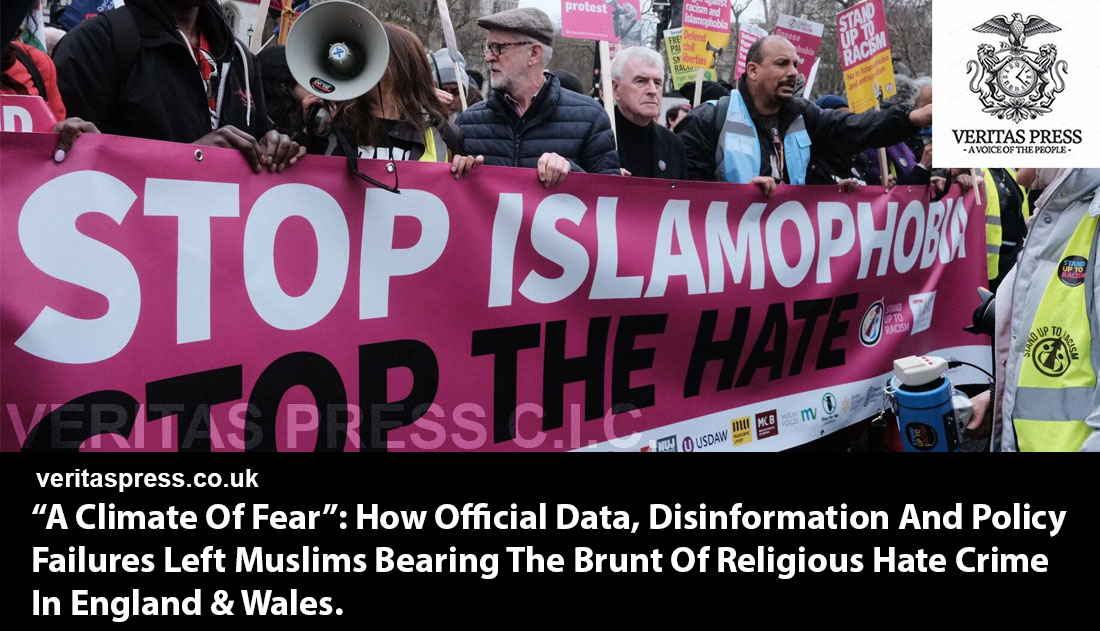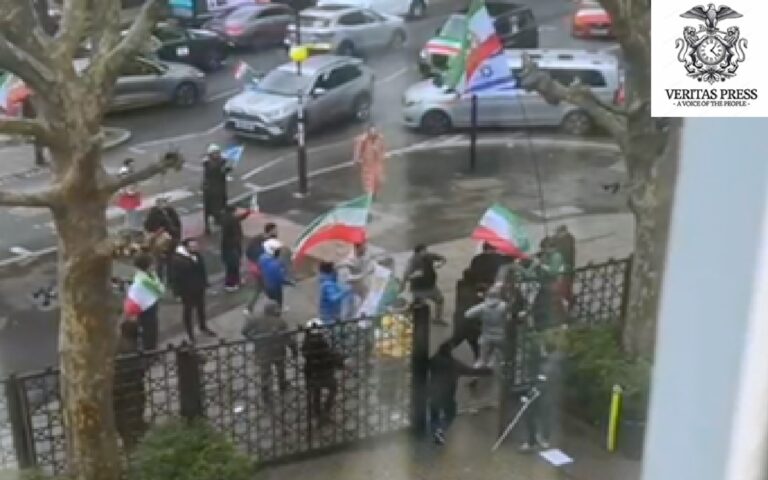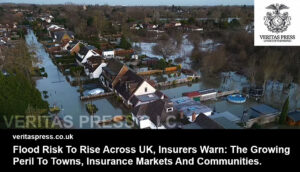The Home Office’s figures for the year ending March 2025 show religiously motivated offences recorded by police in England and Wales reached a record high: 7,164 offences (excluding Metropolitan Police Service data because the Met changed recording systems). Within that tally, offences targeting Muslims rose 19% year-on-year, from 2,690 to 3,199, producing a raw-share picture used in public reporting that roughly translates to Muslims bearing about 45% of all religious hate crimes in the dataset outside London. The department itself flagged a “clear spike” in August 2024 that coincided with the Southport murders and the subsequent unrest.
But those headline numbers hide three deeper problems: (1) systematic under-capture and gaps (notably the Met exclusion and continuing under-reporting), (2) the political and digital drivers that convert an isolated atrocity into a wave of targeted hatred, and (3) inadequate state responses to protect communities and to tackle the online pipelines that seed violence.
1) Numbers, missing data, missing context:
Two caveats matter immediately. First, the Home Office explicitly excluded Metropolitan Police figures from year-on-year comparisons because the Met changed its crime recording system; the Met previously accounted for a large share of religiously motivated offences, including 40% of recorded anti-Jewish hate crimes in the last year, and its omission means national totals (and percentage shares by religion) are not fully comparable. In short, the published figures almost certainly understate the full scale and may distort relative shares.
Second, police data are only the tip of the iceberg. Community bodies and monitoring projects repeatedly warn that the majority of hate incidents never make it into official statistics, through fear, lack of trust in policing, or because reporting routes are fragmented. The Muslim Council of Britain (MCB) described the data as “shocking” and warned that these figures reflect only a fraction of the Islamophobia endured by communities; MCB Secretary-General Zara Mohammed said: “The spike in Islamophobic hate crime is, sadly, not surprising and reflects the increased hatred experienced by British Muslims… Most Islamophobic hate crimes go unreported, meaning this data highlights only a small part of the issue.”
2) From Southport To Social Feeds, How Disinformation Becomes Street Violence.
The Home Office singled out a concentrated surge in August 2024 that followed the Southport murders on 29 July, when social media rumours falsely linked the attacker to Islam and asylum status. That misinformation was amplified rapidly across platforms and channelled into hundreds of far-right mobilisations and protests in the following days, which in turn correlated with a spike in Islamophobic offences across towns and cities. Counter-extremism researchers at ISD tracked the pattern: online conspiracies and organised far-right channels acted as an accelerant. The result was a short but intense national wave of scare tactics, mosque attacks and street intimidation.
Tell MAMA: the charity that has monitored anti-Muslim hatred for more than a decade, recorded an unprecedented rise in both online and street-based incidents in 2024. Its 2025 analysis described sharp increases in threatening behaviour, online vitriol and a major rise in street assaults and vandalism, with many spikes clustering immediately after the Southport events. Tell MAMA director Iman Atta warned that the data show a “normalisation of anti-Muslim hate” and urged the government to treat online platforms and offline mobilisation as a single ecosystem that can be policed and prevented.
3) Community Testimony: “We Are Living In Fear,” Charities, Campaigners And Mosque Leaders.
Community organisations describe the statistics as evidence, not the full story. The Muslim Women’s Network UK (MWNUK), which launched a Muslim Safety Net helpline in response to rising incidents, said the official silence and the modal under-reporting have left many households anxious and politically unprotected. MWNUK CEO Baroness Shaista Gohir has been explicit: media double standards and political omission compound the harm, and “the level of scrutiny” at times “appears to have less to do with advancing equality and more to do with an opportunity to be negative about Muslims.” In public statements, the charity has said that its own work shows a very high non-reporting rate and that frontline support is being overwhelmed.
When mosques are attacked, the rhetoric of solidarity is often swift, but the long-term safety measures are patchy. After the Peacehaven mosque arson, a shocking attack that left the building badly damaged and prompted arrests, local leaders described a community shaken and exhausted. Police pledged inquiries and the Prime Minister and Home Secretary condemned the attack, but mosque leaders and community organisers say the government’s Places of Worship Fund and stepped-up patrols are reactive and under-resourced relative to the persistent threat.
4) Political And Institutional Accountability: Mixed Words, Limited Strategy.
The Home Secretary, Shabana Mahmood, has publicly acknowledged that “Jewish and Muslim communities continue to experience unacceptable levels of often violent hate crime” and pledged £50m to bolster security at places of worship and to increase patrols. But civil society leaders argue that security funding and visibility are not the same as deterrence or prevention. Increased patrols may reassure in the short term; they do not disrupt the online ecosystems where violent narratives coalesce, nor do they fix the reporting and prosecutorial pipeline that sees relatively few convictions for pitched, organised hate.
There is also an unresolved political friction: Tell MAMA, central to decades of monitoring, has faced government funding uncertainty and public scrutiny over governance and transparency. Critics (including some Muslim peers) have called for greater accountability from Tell MAMA; defenders point out that the organisation historically fills a government-funded gap in specialist reporting and victim support. The consequence is policy drift: a vital monitoring function threatened by funding changes at the precise moment national incidents have surged. The Guardian’s reporting documented the fallout and the high stakes of withdrawing specialist resourcing while threats rise.
5) The Policing Gap: Trust, Data And Prosecutions.
There are three interlocking policing failures:
- Data incompleteness and comparability: excluding the Met from year-on-year comparisons was statistically necessary but politically consequential; it masks the London picture and complicates national policy responses.
- Under-reporting and community mistrust: community organisations stress that many victims do not report: they fear victim-blaming, inaction or reprisal. The Muslim Women’s Network says as many as 80% of incidents go unreported to police in some local surveys.
- Low conversion to convictions: national commentary and CPS data show higher referral numbers but relatively few prosecuted or sustained convictions in targeted hate crimes, reducing deterrent effects. (CPS statistics indicate growth in hate-flagged referrals, but prosecutorial results lag behind.)
6) Misinformation, Platforms And The Far Right: Structural Drivers.
Investigations by ISD and digital monitoring groups show the pattern clearly: a short rumour, seeded on X, Telegram and fringe forums, gains traction, is amplified by influencer accounts and then translated into physical mobilisation by organised far-right groups. The process is fast and scalable. Without targeted takedowns, platform accountability, or a fast domestic counter-misinformation capacity tied to policing, the pipeline from post to protest to hate incident remains intact. Civil society leaders say the government’s interventions are ad hoc and lack the cross-departmental muscle (Home Office / DCMS / police / Ofcom) required to cut that pipeline.
7) What Communities Want, And What Would Actually Reduce Harm:
From the many frontline organisations we spoke about through their public statements and reports, common prescriptions emerge:
- Transparent, consistent national data: publish fully comparable statistics, including the Met as soon as possible, and include breakdowns by local authority and by reporting channel to expose under-capture. (Gov.uk has already signalled the Met exclusion but must now publish the Met data when comparability is restored.)
- Sustained funding for specialist monitoring and victim support: restoring and ring-fencing funding for specialist organisations, not only for security grants but for monitoring agencies and helplines, so they can continue victim support and rapid analysis. The Tell MAMA funding dispute demonstrated how quickly capacity can be threatened at a critical juncture.
- Online-to-offline prevention: cross-agency powers and platform obligations to remove and counter incendiary misinformation quickly, plus public-facing fact checks and community alerts in the immediate aftermath of a major incident. ISD and monitoring groups argue that rapid mitigation could have reduced the August 2024 spillover.
- Community policing and specialist units: rebuild trust with Muslim communities through long-term investment in community engagement units, victim-centred reporting routes, and independent scrutiny of hate-crime investigations. The MCB has urged adoption of the APPG British Muslims’ definition of Islamophobia to ensure institutional clarity.
8) Voices, What Leaders Are Saying:
- Zara Mohammed, Secretary-General, Muslim Council of Britain: “The spike in Islamophobic hate crime is, sadly, not surprising and reflects the increased hatred experienced by British Muslims… Most Islamophobic hate crimes go unreported, meaning this data highlights only a small part of the issue.”
- Iman Atta, Director, Tell MAMA: the surge of incidents demonstrates a “normalisation of anti-Muslim hate” and shows the need for coordinated government action to protect places of worship and tackle online platforms that amplify hatred.
- Baroness Shaista Gohir, Muslim Women’s Network UK: media double standards and political silence compound harms; the organisation has launched Muslim Safety Net to provide victims with an accessible reporting route and support. “If the concern for women’s rights were genuine, there would be equal focus on the widespread anti-Muslim abuse that Muslim women endure in today’s hostile environment.”
Shabana Mahmood, Home Secretary: “Jewish and Muslim communities continue to experience unacceptable levels of often violent hate crime…. We have stepped up our police patrols at synagogues and mosques…and I am working closely with faith leaders, providing £50 million to keep places of worship safe.” (official comment Investigative
Conclusion: Politically Motivated Islamophobia And Systemic Failure.
The Home Office figures for the year ending March 2025, showing Muslims as the targets of nearly half of all recorded religious hate crimes outside London, are a stark warning, not merely a statistical anomaly. Behind the numbers lies a systemic failure of data collection, policing, and social accountability that leaves communities exposed to sustained violence and harassment.
Most of the hate directed at Muslims is not random or spontaneous; it is politically motivated, fuelled and amplified by far-right activists and organisations. The spike following the Southport murders illustrates this clearly: false social media claims about the attacker’s religion and asylum status were deliberately spread by extremist networks, triggering protests, riots, and a surge in Islamophobic attacks across multiple towns and cities. These actions are strategically intended to provoke fear, polarise communities, and mobilise anti-Muslim sentiment for political gain.
The state’s responses, £50 million allocated for mosque security and increased patrols, are reactive, addressing only the symptoms while ignoring the structural causes. Far-right mobilisation, the rapid spread of disinformation online, and gaps in policing and prosecution remain largely unaddressed. Without systemic intervention, the very mechanisms driving politically motivated hate remain intact.
Community leaders are unambiguous: short-term security measures are insufficient. Zara Mohammed of the Muslim Council of Britain calls for transparent, comprehensive reporting across all forces, including the Met. Iman Atta of Tell MAMA highlights the need to disrupt the online-to-offline pipelines that extremist groups exploit to radicalise public sentiment against Muslims. Baroness Shaista Gohir of the Muslim Women’s Network stresses that the real, lived experience of Muslim women and children, often ignored in public debate, is central to understanding the scale and nature of the threat.
This is not just a rise in crime statistics; it is a reflection of a politically charged environment where Islamophobia is weaponised, amplified by far-right actors, and tolerated by gaps in institutional response. The rising tide of anti-Muslim hate crimes is a test of the state’s commitment to equality, justice, and public safety. Without urgent, systemic reform, including full transparency of police data, targeted prevention of extremist mobilisation, regulation of digital platforms, enhanced community engagement, and sustained funding for frontline organisations, these statistics will not become a temporary spike, but a recurring norm.
The evidence is clear: Muslims in England and Wales are living in fear, not by accident, but as the result of politically motivated attacks, structural neglect, and societal complacency. If the state fails to act decisively, the weaponisation of Islamophobia by far-right actors will continue to threaten both community safety and the integrity of British democracy itself.































